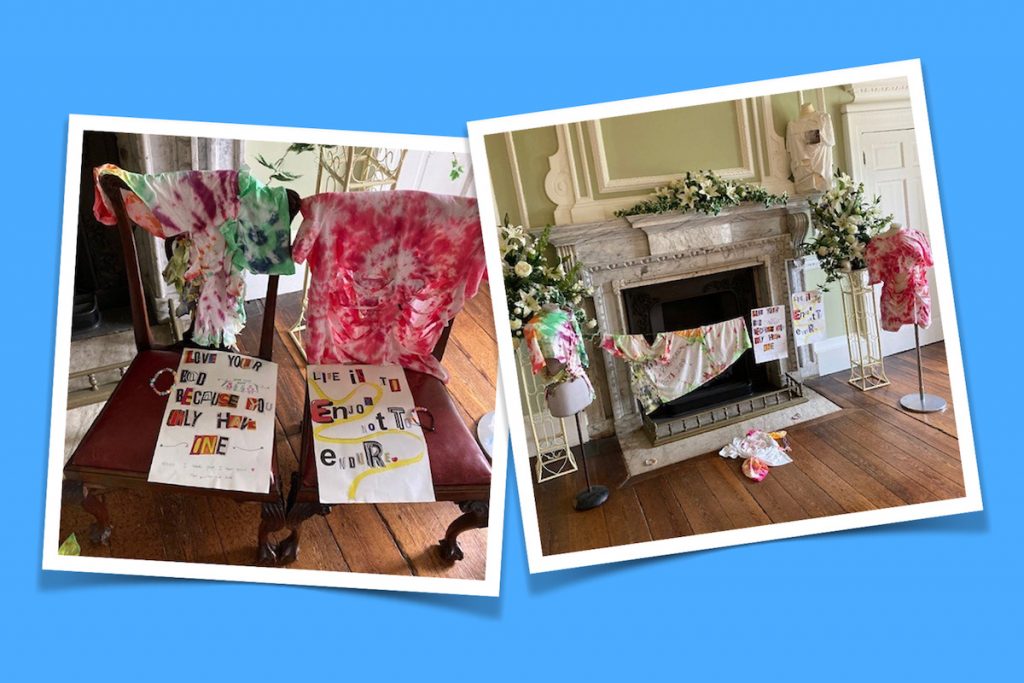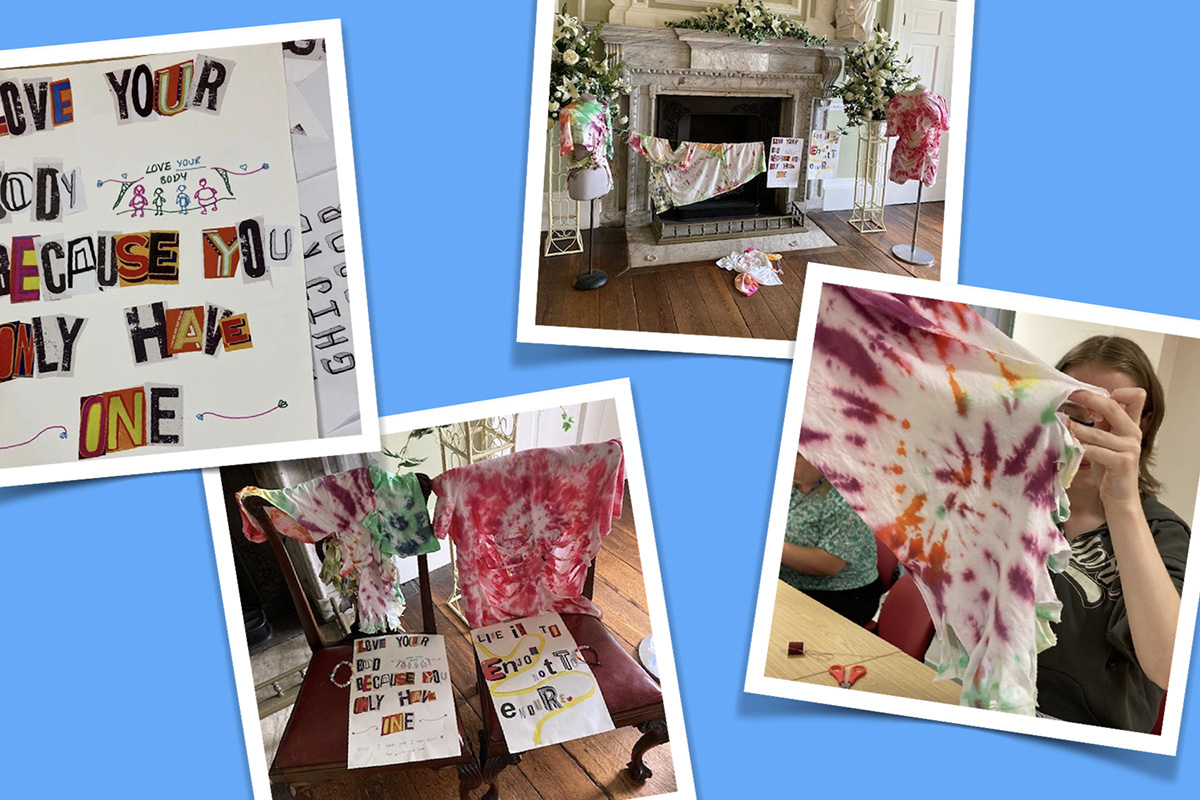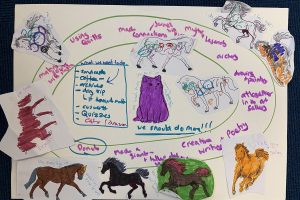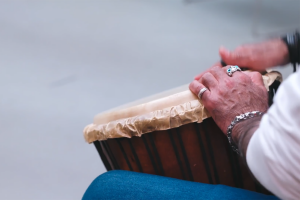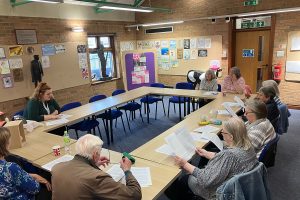Introduction
In 2023 Heritage Doncaster and Doncaster Child and Adolescent Mental Health Service (CAMHS) co-designed a creative programme for young people (aged 12-16) accessing disordered eating services. The programmed formed part of the wider History, Health, Happiness provision delivered by the Community Engagement team.
Who?
Teenagers (12-16 years old) from South Yorkshire at risk of disordered eating, working under Children and Adolescent Mental Health Services (CAMHS).
What?
A creative 10-week group course explored body image through time. Sessions were designed to boost participant self-esteem, build confidence, and facilitate group and peer therapeutic discussion by exploring ideas of beauty and body image. Museum collections, handling objects and historic photographs formed prompts for discussions and ideas generation, with participants working with an artist to respond to session themes and topics explored. The programme culminated in participants expressing views on bodies through deconstructing and reconstructing clothing, alongside an artist. Therapeutic support was provided by CAMHS disordered eating nurses.
Sessions 1-2 explored self-esteem and body image themes and was led by CAMHS nurses.
Session 3-6 further explored historical ideas of beauty through object handling and looking at historical images from Heritage Doncaster’s collection. Led by Heritage Doncaster staff, the sessions involved recreating historical beauty products to experience beauty in the past.
Sessions 7-9 responded to historical ideas through artwork. Participants took part in collage, deconstructing and reconstructing clothing and making expressive jewellery. Artistic methods were chosen by the young participants and led by an artist.
Session 10 was led by Heritage Doncaster staff, and the artwork was finalised for display at Cusworth Hall. Participants were invited to bring their friends and family.
Where?
This initiative took place at Conisbrough Group Practice GPs, in collaboration with the Disordered Eating CAMHS team. Nurses were present during all sessions to ensure the young people were supported therapeutically.
Why?
- NHS England data shows 208 children and young people began treatment for eating disorders at Rotherham Doncaster and South Humber NHS Foundation Trust between July 2020 and June 2021. This is a significant increase in cases.
- The Doncaster Children and Young People’s Mental Health and Wellbeing Strategy 2022-2025 references the “significant rise in the requirement for Eating Disorder referrals, with the service reporting recent levels of demand reaching peaks last experienced in January 2020”.
- The number of children and young people requiring secondary care provision in Doncaster has increased significantly. This includes admissions for eating disorders, self-harm and overdose.
Further information can be found at:
- Doncaster Children and Young People’s Mental Health and Wellbeing Strategy
- Doncaster Children and Young People’s Plan
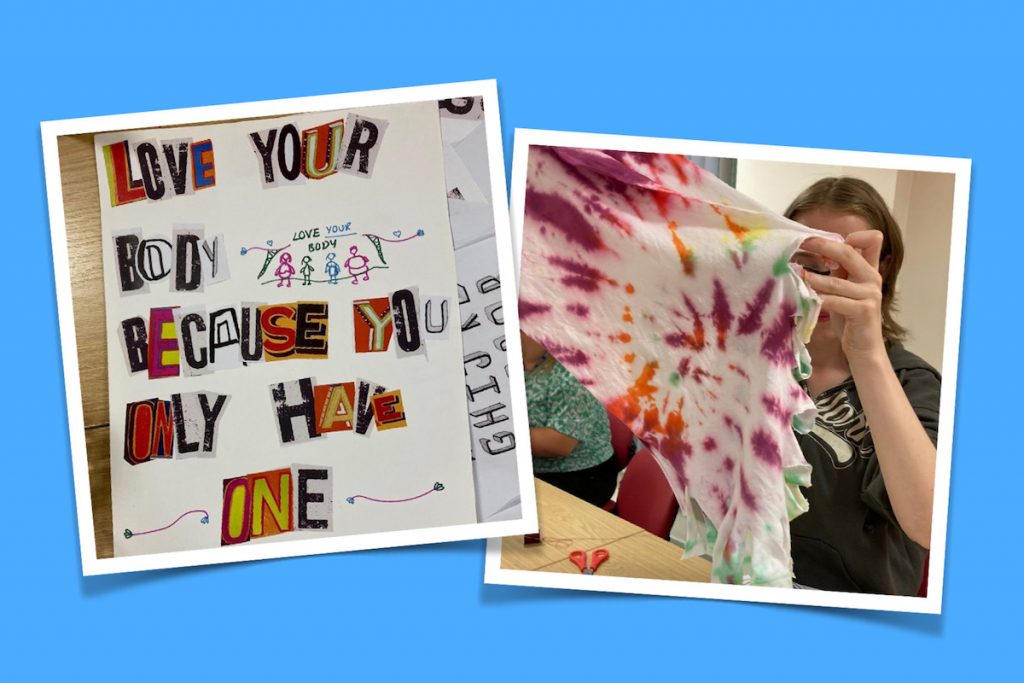
Impact
Improved Wellbeing: All young people who attended, self-reported increased confidence, and building connections with other participants, a key indicator of growth in wellbeing was also reported. Participants noted that the historical reflection was useful for their mental health: “Seeing how quickly fashion changed helped me realise society expects too much”.
Improved body confidence and EDE-Q results: The young people who attended saw improved overall EDE-Q scores. The Eating Disorder Examination Questionnaire (EDE-Q) is designed to assess the range, frequency and severity of behaviours associated with a diagnosis of an eating disorder. For all the young people, worries about their body shape reduced following completion of the creative group. PSYCHLOPS mental health scores also improved, with participants revealing they thought less about calories and struggled less eating in front of people.
Young People and Prevention: This programme worked directly with young people referred to CAMHS for disordered eating and aimed to prevent escalation and relapse of the condition. The programme was co-designed as an intervention as part of recovery with the CAMHS nurses, with a focus on boosting self-esteem and enabling peer and group discussion.
Collaboration: The course was co-designed by culture staff and CAMHS nurses, bringing together creative and therapeutic expertise to best support young people. It was also important that the participants had the opportunity to shape the sessions.
Intergenerational experience: The opportunity to have intergenerational conversations about body image, beauty and self-esteem was also important: “I really enjoyed talking to different women about bodies.” CAMHS nurses felt that these conversations were significant, as they perhaps did not take place at home.
Safeguarding and Risk Assessment
Key to undertaking any creative health initiative is the safeguarding componant and this is especially important when working with young people. The team delivering the sessions had DBS checks and had completed Doncaster Council’s safeguarding training. Importantly, two CAMHS nurses were present in every session and were able to provide therapeutic support to young participants as required and the two introductory sessions were delivered by CAMHS nurses to establish rapport and to establish the therapeutic context. Each session began with re-establishing the code of conduct and provided an opportunity for each participant to share their feelings of the session ahead. Throughout the programme CAMHS nurses and Heritage Doncaster staff had regular debriefs and risk assessments for each activity were conducted, and included wellbeing risks for staff and participants.
Funding
The 10-week Body Image Through Time workshops were funded by Arts Council England as part of Heritage Doncaster’s National Portfolio Organisation programme.
Award
Body Image Through Time was shortlisted for Best Museums Change Lives Project at the Museums Change Lives Awards 2023.
